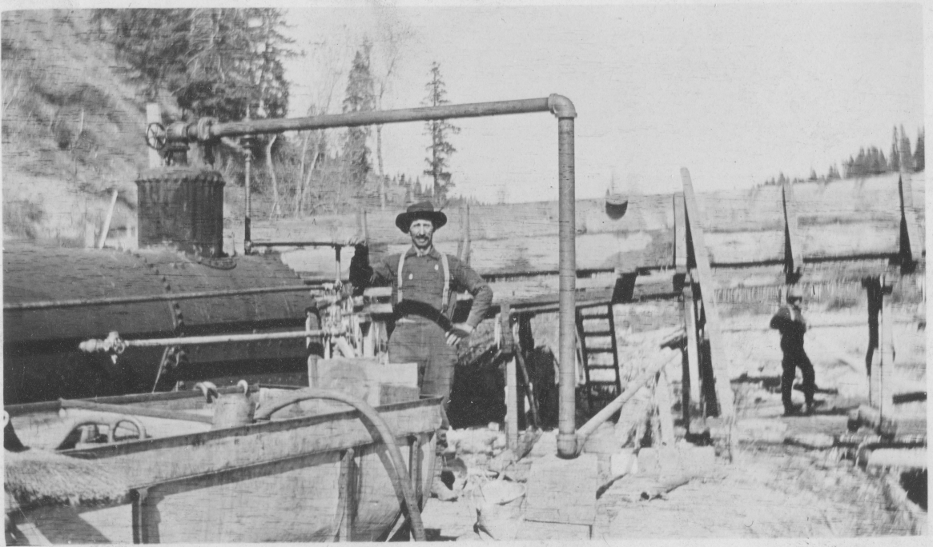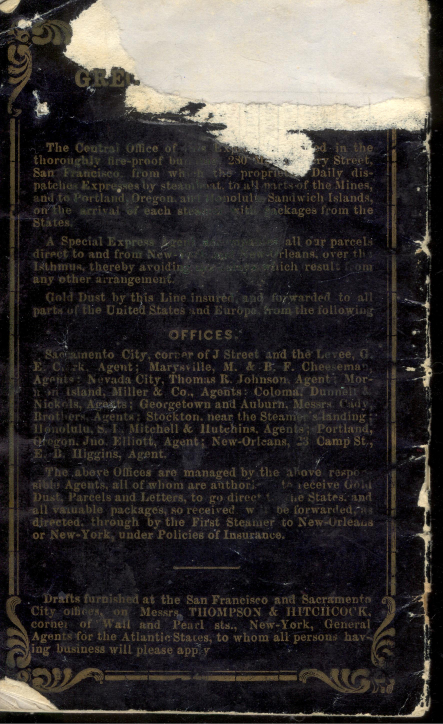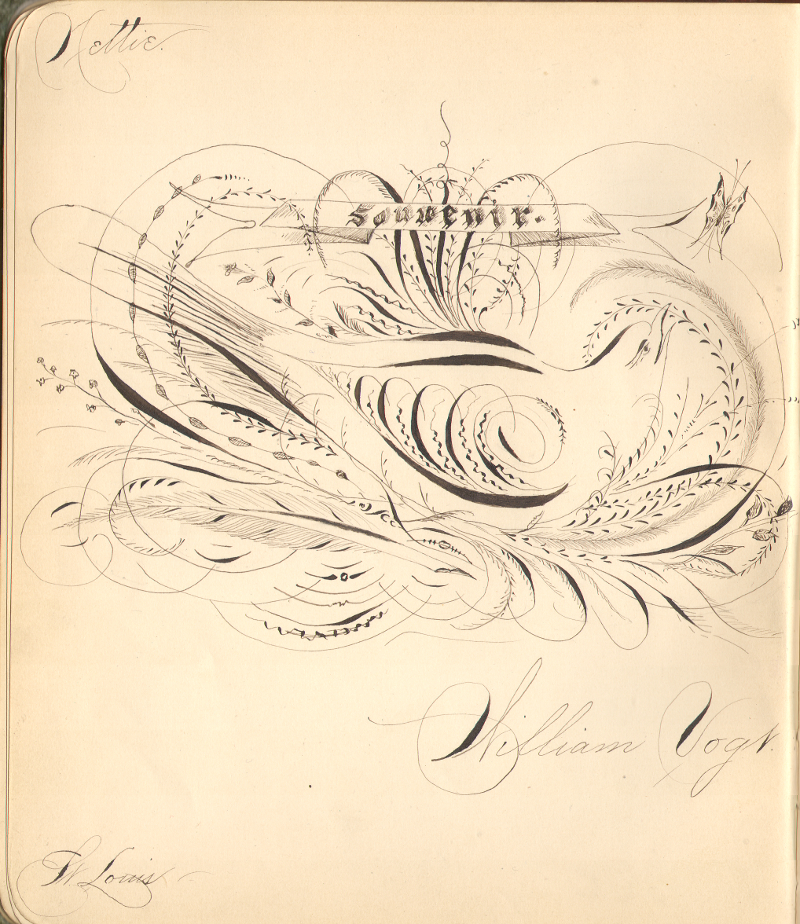In the 1850s, mail from California was a little spendy and potentially unreliable since it either went 'round the tip of South America or across the isthmus in Panama (the Pony Express didn't exist and overland mail was virtually unthinkable). Packet service was well established between New Orleans and San Francisco or Sacramento, so several companies created their own mail services to get letters, packages and gold dust from California back to the states. One of them was Gregory's Express of San Francisco. They sold a small notebook with very fine paper, about 20 pages, that was the same size and weight as a regular folded letter. A person could send quite a long letter from the mines back to his family and not break the bank. Of course, all the other dangers of sending a letter via ocean and isthmus were still there, but at least it was affordable.
Here are a few images of the book that Henry Cooper wrote in.
Port Wine
July the 25th 1852
Dear Mother
I take this opportunity of writing a few lines hopeing they may find you all well. I received a letter from Anne afew[?] days ago and one from you yesterday which informs me that Frank is coming to California. I sent a Letter to
Page 2
Frank and one to Bill and to Anne. But I have not heard from Bill for six months. I dont know where to direct his letters. Its very un certain about getting Letters here. I will write to them again soon and as soon as I hear from them, I will write home. I have had very good health cince I came to California. You seemed to be distressed about excepting of some of Frank money before he started. You need not let that trouble you. He will get along some way or other. He will have no use for it on the plains and he can get some here. I shall be glad see him here. He will have a great deal better chance to make something here than he had in the States. I would advise
Page 3
sell or give away every thing that is no use to you such as young Cattle, poor hogs and sheep. The are more expence than profeit. Keep 1 good yoak of oxen and 2 good big work horses and enough of milch cows for your own se and George and Edward can raze enough to feed them with out much trouble. If they keep a lot of cattle they cant raze enough to feed them. I wouldnt plant more than they can attend to, or else they wont have any in the fall. There is no use in keeping Horses that will jump the fences, hogs that will get in the field. They will destroy more in one night than they are worth.
Page 4
Do not fret your self to death about things out of the House. The Boys know what ought to be done as well as you can tell them. Dont be uneasy about any thing for every thing appears to trouble you a thousand times worce than any body else. Write to me when you get this. Who all has got home from California? Tell me something about all the neighbors and especialy Eli Katts about his trip Home and his health on the way and after he got Home. Willson and Fuller, the Kile boys and Ben Arnold and whether Arnold is coming back the this Country or not. Dr. Grears son was here about a week
Page 5
ago. He is the first that I have seen since I have been here. I do not know when I shall go Home, but I think next spring. I want to get enough here to give me a good start in the States. Business is very dull here now but it will be better in the fall. When Frank gets here we will be of some advantage to onanother. If I can get anough of money ahead I will go home this fall and come back again and leave Frank in my place. I dont know whether I shall go home to the states or not to stay as Bill and Frank has come out here. If we do well we will soon be in the states. As I have wrote to Anne you will see
Page 6
letter. It aint nessesary for me to write much this time. I will write afew lines to George and Edward. No more at present but remain your effectionate son
Henry Cooper
Next, Henry writes a letter to his brothers George and Edward.
Dear Brothers
I now write a few lines of advice to you and at the same time hoping that you will take my advice. That is not to give mother any occaision to be vexed and troubled about things out side of the House. Be industrious through the week and you will be better satisfied at the
Page 7
end of the week. Keep no more than 2 or 3 horses and feed them well and try to keep them fat and fit. Don't let the saddle cut there backs and the color [collar] make their shoulder sore. Keep all your tools in good order. Don't use one of those wooden ploughs. Use a diamond plough. Keep up with your work and dont let it drive you. Dont give mother any occasion to trouble her self about your business.
I want you both to write to me as soon as you get this all about the times and neighbors as far as you are acquanted. How Smedley is getting on with the neighbors and if you have heard from John Jonson and where
Page 8
where he is. Let me know who all has got back from California and who all is married and who is likely to be and let me know who has left or come or moved in the neighborhood. Maybe I will go home next fall or spring. If I do I will fetch you out here or put you in a way to do something there but keep your shirts on and dont be too sure of coming till you some further news. As I have wrote so many letters for home I dont know what to write so I will come to a close.
I want you and Edward both to write as soon as you get this and I will wirte as soon as I here from Frank or Bill. Frank aught
Page 9
to be in California in a week or too.
Give my respects to all enquiring friends. Tell them that I am well and gaining a little in riches.
No more at present but remain your effectionate Brother
Henry Cooper
Send my best love and wishes to Anne and family, Chris and family, Joe and family. No more at present.
------------------
At the time, Henry was 24, George was 20 and Edward was 18. Their father, Christopher (my great-great-great-great grandfather) had died five years earlier, so Henry, as the eldest unmarried son (who wasn't in transit somewhere), took on the role of head of household, from a distance anyway. He was rather stern with his brothers because he knew that they couldn't stand farming and wanted more than anything to head out to California and be with their brothers. Eventually, they did, but not until after Jennett died and the farm was sold (in the 1850s).
There was another brother on the farm at the time, Alexander, who was 11 years old. I assume that he didn't get any brotherly advice because his duties would have been a bit more mundane.
Henry mentioned not knowing when he would go home - he never did go back to the farm in Missouri.
All in all, though, I think that Henry's advice in the second letter would be well-taken in just about any age!
 .
.




